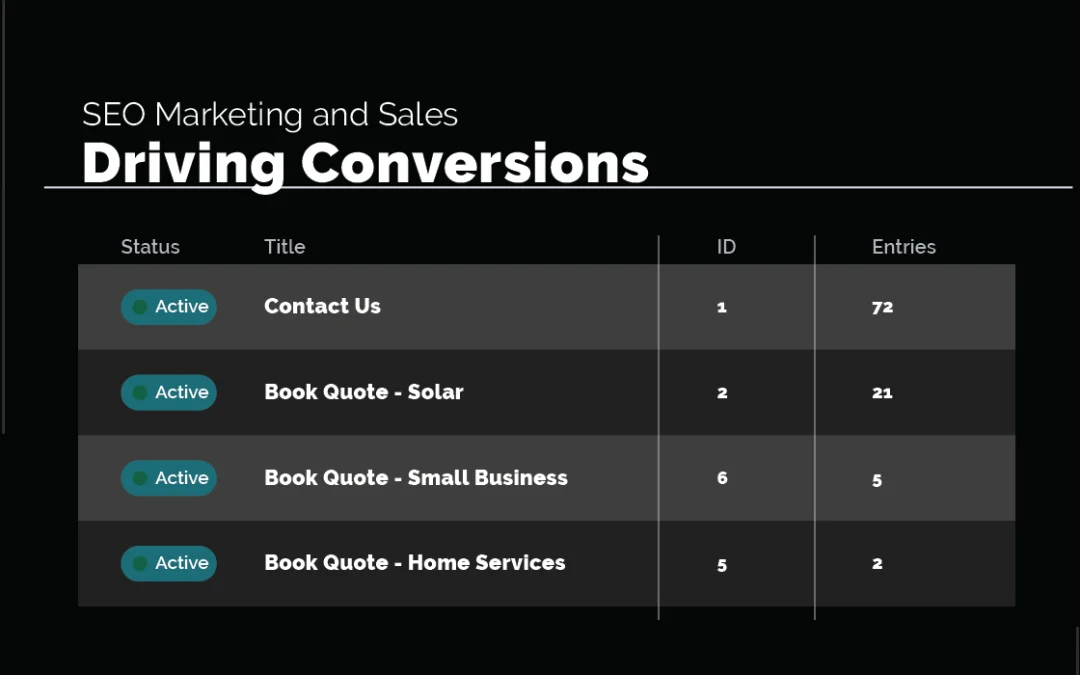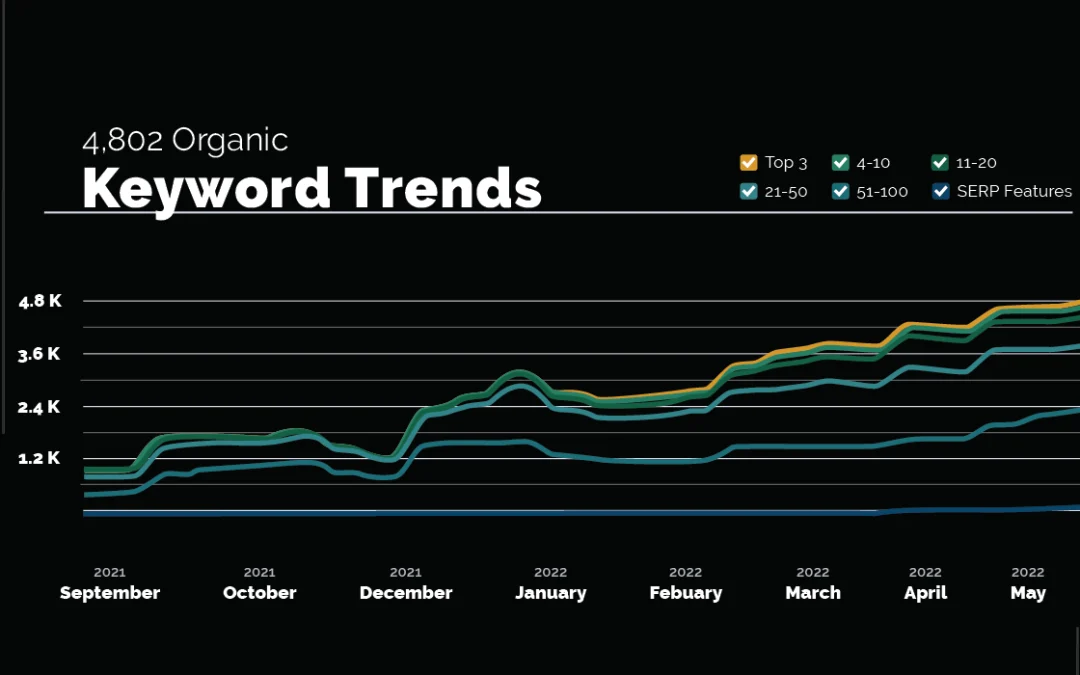Summary:
- AI chatbots and language models like ChatGPT, Bard, and Bing write grammatically perfect copy in a fraction of the time it takes for humans, but these tools can’t produce effective content all by themselves. When AIs are used without a careful strategy in place, their content often contains telltale signs that it was written by a machine.
- AI-generated content typically has an active, neutral voice, a tone that may feel overly clinical or passionless, and will not express subjective preferences unless specifically prompted to argue from a given position. This is because AI does not account for user or creator intent by default.
- AI is currently great at making content that summarizes searchable information and organizes it into a digestible format. It’s not so great at knowing when to break language rules to sound more authentic or create emotional resonance that guides people towards taking specific actions.
- To make the most of AI when creating your content, make your prompts as specific as possible and save time by using it in the places where it’s most effective (like FAQ sections or bulleted lists of facts and product features). Finally, always proofread AI-generated content and massage it until it effectively matches your voice and serves your goals.
The way we use the internet is being revolutionized before our eyes, thanks to AI chatbots like ChatGPT, Bard, and Bing. But using AI for content creation reveals both its stunning potential and current limitations.
While ChatGPT and similar tools can produce grammatically perfect paragraphs in seconds, they struggle to provide opinions or argue from positions. Since high-quality content hinges on providing value for human users with highly subjective values, goals, and pain points, AI alone is often insufficient for creating content that successfully engages them.
Below, we’ll teach you how to identify content written largely (or entirely) by an AI, and provide you with a list of tips you can use to enhance AI content so that it connects effectively with your audience. This will help you take advantage of the efficiency AI chatbots provide for content creators without impacting your content’s value—or its ability to rank and bank.
See Also:
What Does AI-Generated Content Look Like?
The best way to learn what AI-generated content looks like is to see how it’s made, so here’s an example. We’ve kept this simple for two reasons—first, to make the signs that it was written by an AI more obvious, and second, because most people using AI chatbots to write content for them are unlikely to write highly specific prompts.
Check out ChatGPT in action when you give it a basic request:
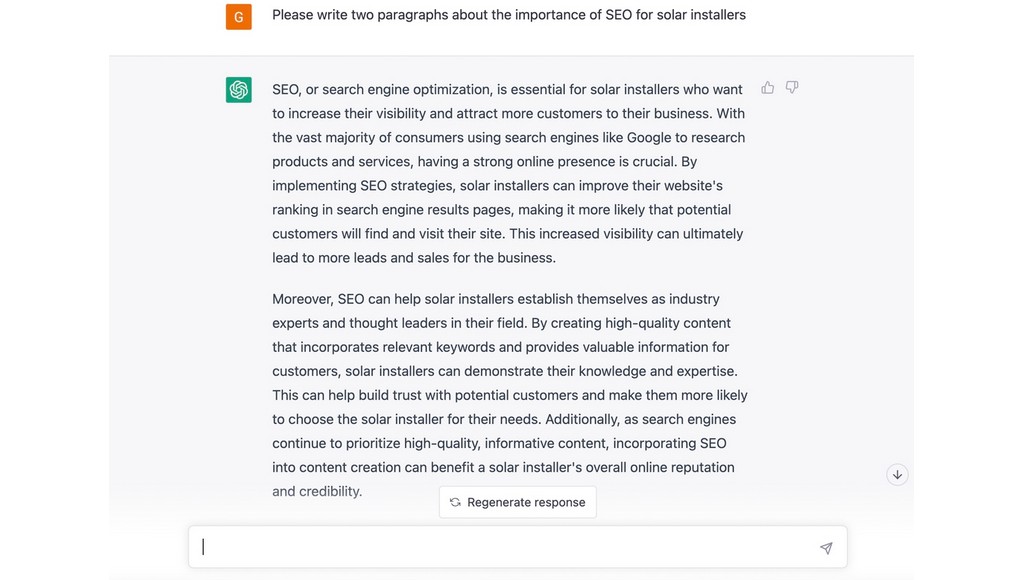
Although it’s impressive that a machine could put that together in just a couple of seconds, there are also plenty of giveaways that this wasn’t written by a human. Here’s a quick list:
You Can Tell You’re Reading AI Content When It…
- Is grammatically perfect
- Has a consistently active, neutral, and assertive tone
- Feels dry, clinical, or passionless
- Does not account for user (or creator) intent
- Fails to take a stand on subjective issues
The first couple of those are self-explanatory, but some of the others require a bit of analysis. Let’s dive in:
First Impressions: Identifying AI Content by Instinct
Most people have a kind of built-in “radar” for recognizing authenticity. You probably notice yours most when you’re listening to music, watching TV, or going to the theatre—you can’t always describe why you like what you’re experiencing; you just know that it resonates with you somehow.
You might say it “gives you chills”, or “tugs on your heartstrings”, or “floats your boat” (or none of those things, because you’re not a hallmark card or a newspaper cartoon from the 1960s).
Content can do this too, although it’s usually on a less dramatic level—like the satisfaction you experience when watching a video that teaches you a new skill or reading a blog that helps you purchase the right tool for an upcoming DIY project. It’s hard to explain, but it’s a feeling that something has “clicked”.
AI-generated content, on the other hand, tends not to produce this. It feels too neutral, too passionless.
Looking at the above, it’s clear the issue isn’t a lack of information. Those two paragraphs about why solar installers can benefit from SEO clearly make a number of solid points, but they make them in a way that’s overly dry and clinical. What makes this content feel that way?
User Intent & Creator Intent: A Challenge for AIs
As an experienced SEO service provider, we think about user intent when we create content, but that isn’t usually the case for AI.
Answering questions like what your intended user wants, and what questions they need answered makes it easier to write content that delivers value to readers, after which that content can be optimized for search engine rankings and monetized effectively.
But creator intent is important too. People who produce content are trying to achieve something. They might want the reader to sign up for an email newsletter, click an affiliate link, or contact the business. When the content is written well, these calls to action (CTAs) don’t overshadow the value the reader is getting—but they’re still an important part of making sure the content can achieve its full potential.
AI chatbots, on the other hand, don’t know who the reader is or what they want. They also have no agenda of their own, beyond responding to the prompts they’re given. So while you can certainly ask ChatGPT to write CTAs, it’s quite difficult to make the AI integrate them naturally into copy. For example:
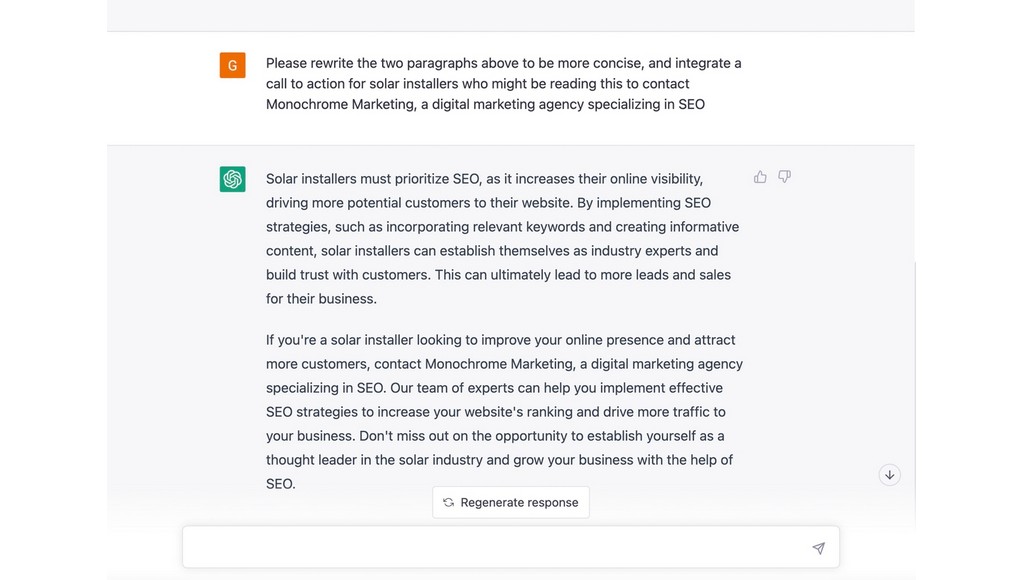
Notice that the AI has technically fulfilled the request, but not in a way that makes the content compelling. The CTA above comes off as overly pushy, self-promotional, and awkward. That’s because it’s simply been tacked on to the end of the content (which, by the way, is pretty generic). The AI hasn’t naturally accounted for the specific goals or position of the person prompting it, because that information hasn’t been explicitly provided.
Basically, AI won’t make any of the assumptions a human writer would make about who the reader is, what they want, or how to solve their problem. AI-generated content doesn’t naturally factor in the creator’s intent.
Taking a Stand: Why AI Waffles on Subjective Issues
Another vital reason AI-generated content often doesn’t “click” with readers is that it can’t provide opinions of its own. While leading AI language models are great at collecting information that exists elsewhere on the internet and rewording it, they stop short of taking definitive positions themselves.
To illustrate this, let’s ask ChatGPT a question most humans would be able to answer simply, based on their own subjective brand preferences:
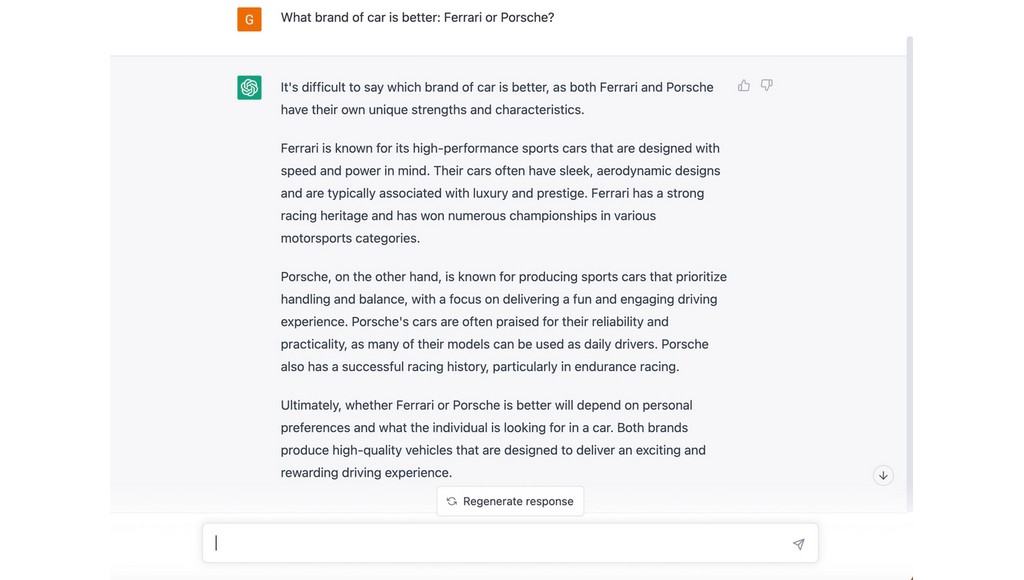
Wow, ChatGPT—way to choose sides.
Ask any car enthusiast in the world the same question, and you’re likely to get a definitive answer. You might even start a fight. But that’s because people have opinions, while AI chatbots don’t. ChatGPT doesn’t drive, or care what you drive—so it has no way of forming a preference. Instead, it avoids answering the question by offering a quick summary of the many and varied opinions that exist elsewhere.
As content creators, this approach doesn’t serve us. Remember, we’re trying to solve a problem for our reader—not make their decision harder by presenting both options as equally viable. Porsche is obviously superior to Ferrari, by the way.
The Strengths & Weaknesses of AI Content
AIs Are Great at Making Content That…
- Summarizes and rewrites information that already exists online
- Organizes complex information into well-formatted paragraphs or lists
- Needs to be produced quickly and without grammatical errors
AIs Aren’t So Good at Making Content That…
- Provides expert opinions to help people make decisions on subjective matters
- Knows when to break language rules (like active vs. passive voice) to sound more authentically human
- Creates emotional resonance for the reader (and guides them towards taking action)
Using AI as a Tool for Creating Your Content
We’re not against using AI to help create content—in fact, that’s what you should be doing if you want to stay competitive, because everyone else is already doing it. The trick is to be specific about how you use AI, and rely on it less for the things it doesn’t do well (at least, not yet).
Best Practices for Using AI to Create Content Include…
- Using specific prompts: tell the AI your target audience, the voice you want it to write in, and the perspective you want it to argue from (if applicable). For example:
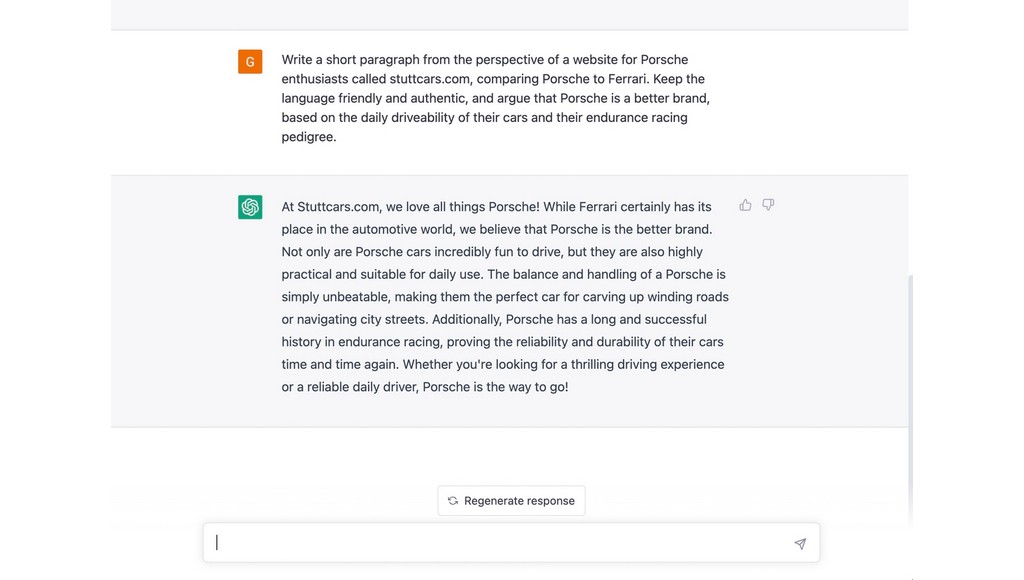
- Compiling information quickly. AI can save you a ton of time organizing verifiable information or common knowledge for bulleted lists and FAQ sections. Let’s go back to the example about SEO for solar installers:
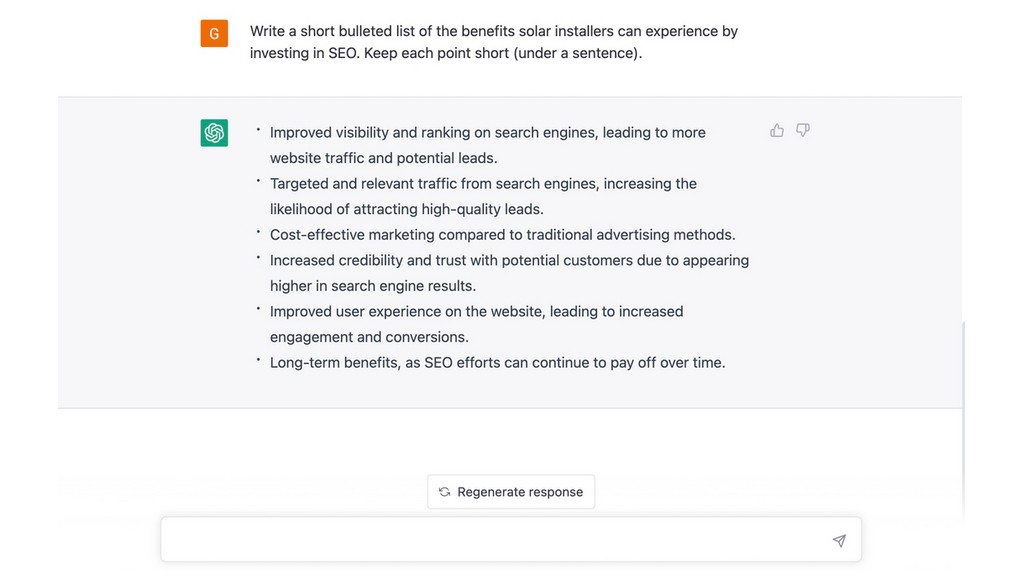
- Carefully proofreading all AI content and refining it with a human touch. This last one is the most important tip on the whole list. Always, always read over anything you’ve had an AI generate so you can verify that it fits your brand, voice, and messaging.
AI Isn’t a Replacement for Content Strategy
Right now, AI is an extraordinarily powerful tool for content creators—but it’s still just a tool, and wielding it effectively takes skill. Be specific with your prompts, consider your user’s experience, and don’t be afraid to tweak what an AI has written to ensure the content supports your goals!
The more you understand about how AIs write content, the easier it becomes to recognize AI-generated content when you see it—and the more effectively you can use AI to enhance your own organic marketing & SEO efforts. For detailed support creating content that performs in a post-AI world, reach out to Monochrome Marketing. We’ll work with you to create a content strategy that uses these cutting-edge tools to create maximum value for your business.




